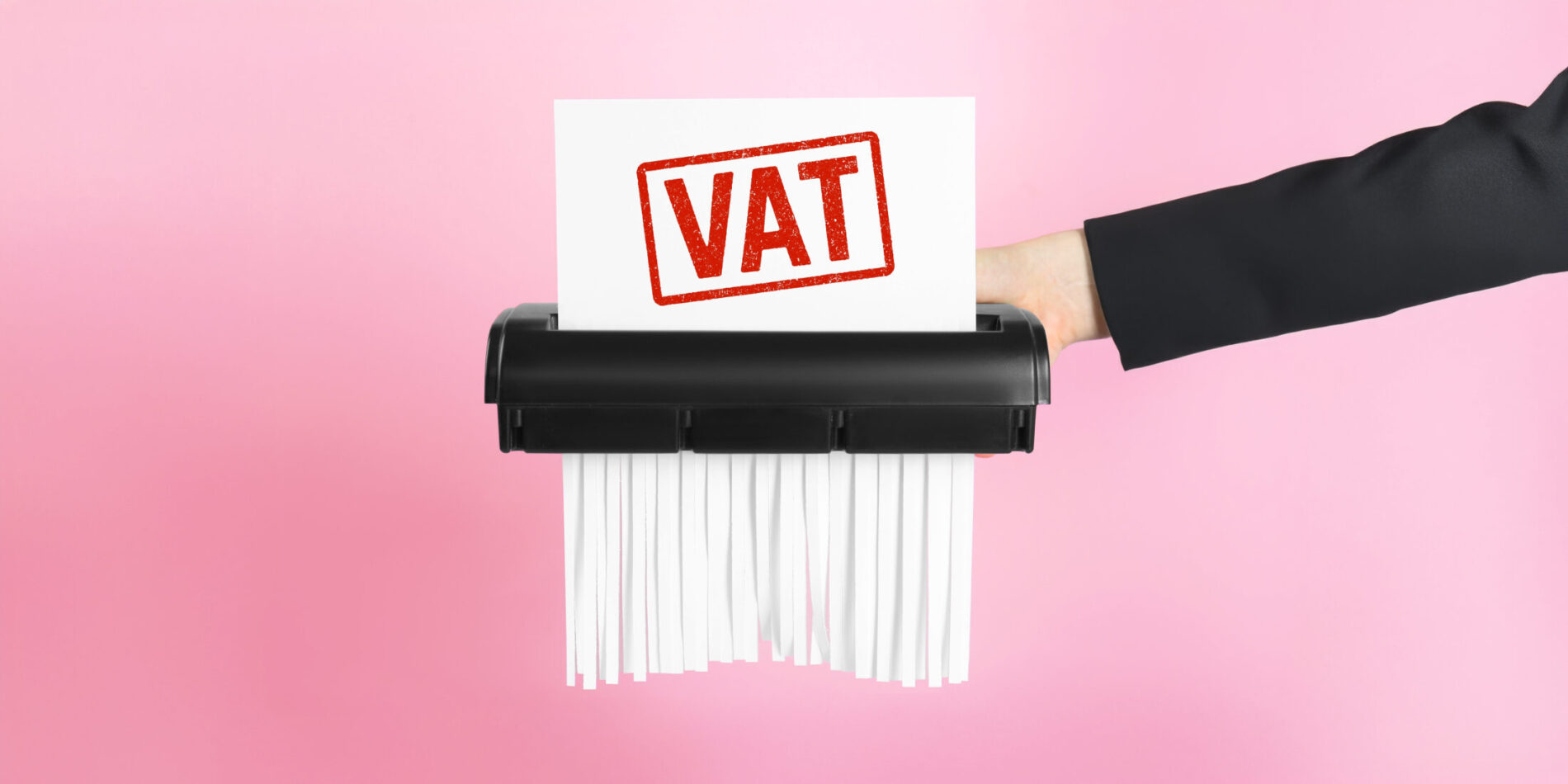Value Added Tax Exempt and Zero-Rated Services: Important Information

As a rule, all entrepreneurs in Switzerland are subject to value added tax (VAT) if they meet the legal requirements. This means: Depending on the tax rate (8.1%, 3.8% or 2.6%), they add VAT to the invoice amount.
However, this obligation does not apply to all deliveries or services! For you as an entrepreneur, it is essential to know what is included and what is not. In this article, we give you an insight into this topic. Among other things, we explain what VAT actually is, who is subject to it and what billing models exist.
Book a free initial consultation with our experts.
Book a callHighlights
- Exempt services do not allow input tax deduction
- VAT liability starts at CHF 100,000 turnover from taxable, non-exempt services
- Zero-rated services allow input tax deduction despite being tax-free
- Opting-in allows VAT disclosure and input tax deduction despite otherwise exempt services
- There are two billing models: the effective method and the flat tax rate method
Content
- Value Added Tax Exempt and Zero-Rated Services: Important Information
- Highlights & content
- How does VAT actually work?
- Who is subject to VAT liability?
- What counts as VAT-liable services?
- Are there exemptions from VAT liability?
- What are VAT zero-rated services?
- Opting-in – how to voluntarily register for VAT
- VAT registration and accounting
- How can Nexova help you?
- FAQ
- That’s what our customers say
How does VAT actually work?

On January 1, 1995, the federal government introduced value added tax (VAT) in Switzerland under the VAT ordinance. This is a general consumption and sales tax levied by the federal government on companies. It follows the principle that those who consume should contribute to society and the state.
Example: If Company A purchases goods or services, it pays VAT in addition to the usual invoice. The supplying Company B acts as a “middle station”. It adds VAT to the invoice amount and then transfers it to the federal government.
In return, Company A can claim the so-called input tax for its expenses. This means it gets the paid VAT refunded from the federal government, or it offsets it against the VAT payable. This relieves companies and prevents double taxation within the value chain.
For the federal government, VAT is one of the most important sources of revenue, financing public welfare and infrastructure. In 2022 alone, VAT revenues amounted to 24.59 billion Swiss francs (Statista).
Find out everything you need to know about our accounting service.
Go to Accounting serviceWho is subject to VAT liability?

First of all, every company operating in Switzerland is potentially subject to VAT. Whether VAT liability actually applies depends on various factors, such as:
- The company provides deliveries or services that are subject to VAT.
- The company exceeds the turnover threshold of CHF 100,000 per calendar year.
The same applies to companies based abroad that operate in Switzerland. For them, the threshold of CHF 100,000 per calendar year applies to worldwide turnover from taxable services in Switzerland.
Book a free initial consultation with our experts.
Book a callWhat counts as VAT-liable services?

In principle, VAT-liable services include all deliveries and services (Art. 18 VAT Act, MWSTG) that meet the following criteria:
- Consideration: You must pay or receive payment for the delivery or service. For example, if you sell a service over the internet, the customer pays a purchase price. You are therefore providing a service for payment, and the income counts as VAT-liable.
- Not tax-exempt or excluded: However, there are also cases where services are not subject to VAT. These include services that are exempt or listed as excluded by law – more on this in a moment.
Examples of VAT-liable services would be:
- Services in Switzerland, such as sales of goods and services
- Services purchased abroad where the Swiss recipient owes reverse charge VAT
- Services that are excluded from tax but voluntarily registered for VAT
Important: You do not only pay or charge VAT on services within Switzerland. Even if you work with foreign customers, you are subject to VAT if the place of performance is in Switzerland – unless they fall under the category of “zero-rated export supplies.”
Find out everything you need to know about our accounting service.
Go to Accounting serviceAre there exemptions from VAT liability?

As mentioned in the previous section, not all services are subject to VAT. In addition to taxable services, there are also VAT-exempt services, such as those in the healthcare sector. In general, this regulation protects areas of general social interest or ensures access to essential services.
Some examples of exempt services:
- Services in healthcare, such as medical treatments
- Services in education, such as school lessons
- Services in culture, such as theater performances
- Rental/sale of real estate
You can view the complete list in Art. 21 VAT Act, MWSTG. For the companies concerned, however, this also means that they cannot claim input tax deductions!
Book a free initial consultation with our experts.
Book a callWhat are VAT zero-rated services?

Just like exempt services, you do not have to pay or charge VAT on zero-rated services. But where exactly is the difference between the two? In short: input tax deduction. Unlike exempt services, you can claim input tax deduction here.
Some examples of zero-rated services:
- Direct export of goods
- Lease/charter of goods predominantly used abroad
- Transport/dispatch of goods in connection with import and export (incl. related services)
- Supplies/maintenance for aircraft to airlines with predominantly international flights
If you also operate beyond Swiss borders, this has two decisive advantages: You do not need to fear double taxation, and thanks to input tax deduction, your company remains financially relieved. Both you and your customers benefit, as you can keep your prices competitive.
Find out everything you need to know about our accounting service.
Go to Accounting serviceOpting-in – how to voluntarily register for VAT

If you are exempt from VAT, opting-in allows you to voluntarily subject yourself to VAT. Through registration, you can then still show VAT on your invoices and consequently benefit from input tax deduction.
But how does opting-in work? As soon as you clearly show VAT on invoices or receipts, or declare it in the VAT return. For example, if you indicate the standard rate of 8.1% on the invoice, the taxation of otherwise exempt services counts as opted-in. Exempt services can also be declared as opted-in in the regular VAT return.
However, opting-in is not always possible and is generally excluded in the following cases:
- Insurance services (Art. 21 Abs. 2 Ziff. 18 MWSTG): All classic insurance services.
- Monetary and capital transactions (Art. 21 Abs. 2 Ziff. 19 MWSTG): Transactions such as credit, payment processing, or trading securities.
- Bets, lotteries, and gambling (Art. 21 Abs. 2 Ziff. 23 MWSTG): Transactions subject to special taxes or other levies.
- Transfers of rights to real estate and properties: The sale or granting of real rights, e.g., for single-family homes or condominiums for residential purposes (Art. 21 Abs. 2 Ziff. 20 MWSTG).
- Rental and provision of residential property: Renting an apartment to private individuals for residential purposes (Art. 21 Abs. 2 Ziff. 21 MWSTG).
Book a free initial consultation with our experts.
Book a callVAT registration and accounting

If your company offers taxable services and exceeds the turnover threshold of CHF 100,000, it is considered VAT-liable. Consequently, you must register with the Federal Tax Administration (ESTV).
Registration and accounting process
You must register your company within 30 days of becoming liable for tax. You can do this either directly with ESTV or via the EasyGov online portal.
Please have the following information ready to ensure everything runs smoothly:
- Company details, such as commercial register excerpt
- Social security number (only for sole proprietorships, simple partnerships, associations, or foundations)
- Revenue forecast for the first fiscal year
- Foreign companies need the details of their tax representative
Once your company is registered, you will receive a tax identification in the form of the Business Identification Number (UID) with the suffix “MWST” (e.g., CHE-123.456.789 MWST). You must now display this number on all invoices and submit VAT returns on time. There are two common accounting methods: the effective method and the flat tax rate method.
Effective accounting – the standard method
Most companies use the effective method for VAT. With this method, accounting is based on the difference between collected and paid taxes. You calculate the VAT collected on your sales and subtract the VAT recorded as input tax. The resulting difference is the payable VAT, which you then remit to ESTV.
Example: In the first quarter, you achieved taxable sales of CHF 250,000. At a standard rate of 8.1%, the VAT due is CHF 20,250. At the same time, you have input tax amounts of CHF 5,000 from incoming invoices. After deducting CHF 5,000, the tax liability amounts to CHF 15,250, which you must transfer to ESTV.
Advantages of effective accounting:
- Flexibility: Especially with fluctuating revenues and expenses, you benefit from this method, as the actual tax liability is based on real figures.
- Input tax deduction: You can claim input tax.
- Transparency: This method provides a clear overview of your company’s tax burden.
Disadvantages of effective accounting:
- Administration: You must record and correctly book all invoices and receipts.
- Complexity: With many different input tax amounts, the method can be challenging, especially for smaller companies.
Flat tax rate – the simplified method
In addition to effective accounting, there is also the flat tax rate method. It is considered a simplified method, where the company pays a fixed percentage of its turnover to the federal government. Unlike effective accounting, this method is based on a fixed percentage applied to your total turnover. This significantly reduces administrative effort, as the tedious calculation and declaration of input taxes is eliminated.
Companies must meet the following requirements to use the flat tax rate:
- Annual turnover from taxable services must not exceed CHF 5,024,000.
- The maximum tax owed on this basis is CHF 108,000 per year.
- Apply for the net tax rate method with the ESTV within 60 days from the start of the tax period; on initial registration, within 60 days of notification of the VAT number.
But how does the method work in practice? With this method, you multiply the taxable turnover by a fixed percentage set by the federal government. The flat tax rate is determined by your industry and the average input tax deduction. Since January 1, 2024, it ranges from 0.1% to 6.8%. You then pay the calculated amount directly to ESTV. The advantage? You do not have to declare input tax separately.
Example: In the first half of the year, you achieve sales of CHF 300,000. Your flat tax rate is 6.2%, so you pay CHF 18,600 VAT to ESTV.
Advantages of the flat tax rate:
- Lower effort: You do not need to calculate input tax and only need to submit VAT returns semi-annually.
- Predictability: Since you pay a fixed tax rate, you can better plan your expenses.
Disadvantages of the flat tax rate:
- Industry-dependent: Companies with atypical cost structures must carefully check whether the flat rate covers their individual needs.
- Problematic for larger investments: Larger companies may be better off with the effective method due to higher input tax deductions.
Here you can easily calculate the costs of your accounting.
Price calculatorHow can Nexova help you?

Handling VAT correctly poses challenges for some companies. Questions such as: “Which accounting model should I use?” or “What about foreign companies?” are not always easy to answer. Our article explains the basics and clearly outlines the differences between the effective and flat tax rate methods.
But what if some questions remain unanswered? Nexova is your competent partner when it comes to VAT and accounting. Our digital, paperless solutions and our experienced expert team ensure that your tax processes always run correctly, efficiently, and in compliance.
Secure your free consultation today and learn how Nexova can support you with digital solutions and an experienced expert team.
FAQ
Answers at a click
What is the difference between VAT-exempt and zero-rated services?
For both options, you do not have to pay VAT! However, the difference lies in the input tax deduction. While you cannot claim input tax on exempt services, it is possible for zero-rated services.
Where do I register VAT for my company?
You can register directly with ESTV or via the EasyGov online portal.
How is VAT accounted for?
Accounting is done using one of the two models: the effective method or the flat tax rate.
What about foreign companies?
Companies based abroad that offer their deliveries or services domestically are subject to the same regulations. They must also pay VAT if they meet the requirements.
That’s what our customers say
Your feedback matters
Mr. Merz has a very broad knowledge and was able to help me with all my questions. The conversation was very pleasant and very informative for me. Thank you for your support.
Uncomplicated or serious? Both here. A young, smart team is at work here, offering excellent services, highly uncomplicated and competent. Instead of a prestigious reception area, expensive offices and a few small gifts, you offer fast and competent services. For me as a one-man company, this is exactly what I need.
I have been a Nexova customer for some time now and so far I am very satisfied! Thanks to the digital working methods and high responsiveness of the client managers, little time is lost in the daily process in particular. The prices are also very fair. Nexova handles the annual financial statements for me, including the tax balance sheet. The processes are standardized, which is a great advantage for audits (AHV and taxes). The two founders are two young, innovative guys and very serious.
The friendly and competent Nexova employee was able to answer my questions about company car taxation quickly and specifically. Thank you very much for this!
When I founded my company a year ago, I needed a reliable fiduciary partner. In addition to pure accounting, Nexova also offers me very good advice on all aspects of labor law. Thanks to the E-Post solution, I no longer even have to worry about my company mail and can focus purely on my service activities. My contacts at Nexova are always very friendly and pleasant to deal with. The complete package is simply TOP and I can only recommend Nexova!
Top company & friendly owners. A highly recommended trustee.
Very good and competent advice!
Professionally at a very high level. They are very good with Excel and could also support us with automation of processes.
I had a few questions about remote work and was advised super and free of charge. Thank you very much!
Very good service. Good and competent advice with friendly staff. I can definitely recommend
The Nexova team is very professional and I felt they always had my best interests at heart. I highly recommend Nexova and will continue to refer my clients to them and trust them with my business.
I am impressed with their outstanding service, especially in the field of accounting services, they demonstrate a professional approach and exceptional attention. As a lawyer, I have found Nexova to be a valuable partner in the financial world.
I had an excellent consultation with Nexova AG regarding withholding tax. Their expertise is remarkably extensive and their guidance was invaluable, I highly recommend their services. A first class experience.
The Nexova Team is an important partner to our startup, enabling us to pass all of our accounting, tax and payroll duties. We specially value their expertise with Startups and flexibility, which allows us to plan and manage our financials effectively and to focus on the bottom line of our operations.
We are very satisfied with Nexova as our trustee. Thanks to the Teams group chat, I can always count on very fast response times (of a few minutes). The Teams Chat group is great. With our old trustee, we had to write mails and always had to wait a long time for an answer and on top of that we were charged for every little question. Fortunately, this is not the case with Nexova.
Nexova solved my problem with a non-paying tenant quickly and efficiently. I was simply overwhelmed with the situation and glad for the competent legal advice. Nexova handled everything from the reminder with threat of termination, to representation in court, to the police eviction quickly, efficiently and also inexpensively. Many thanks for the valuable help.
